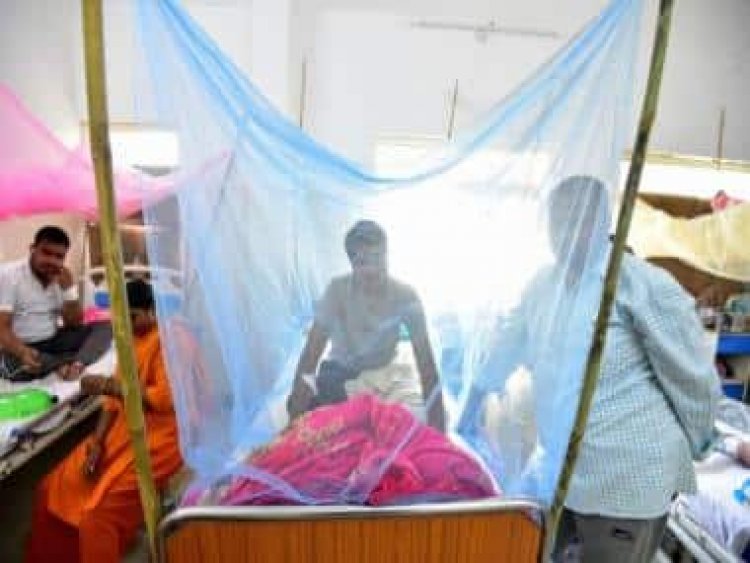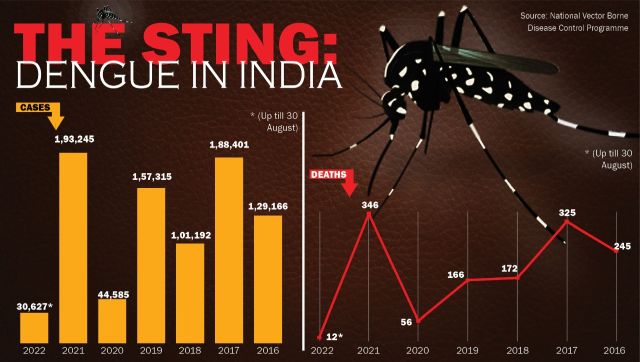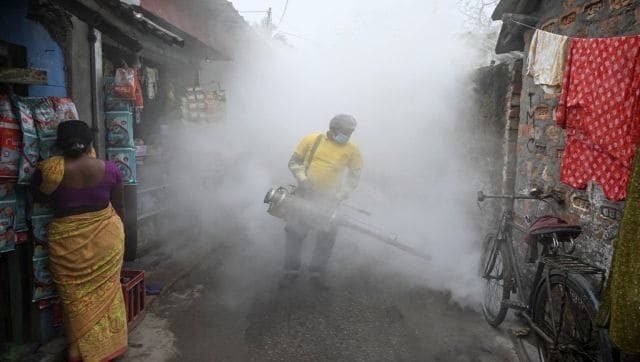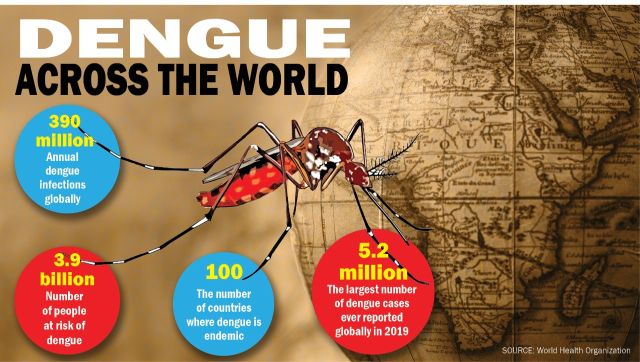The Sting is Back: How dengue has wreaked havoc in India as well as Pakistan and Sri Lanka
The Sting is Back: How dengue has wreaked havoc in India as well as Pakistan and Sri Lanka

With the rain showing no signs of retreating, India is struggling with an outbreak of dengue. Across the country — from Jammu to Bengaluru — states are seeing a record number of cases of the mosquito-borne disease.
States like Maharashtra, Uttar Pradesh, Punjab and Rajasthan are also seeing an uptick in dengue cases, with officials now issuing a warning that October could be the most vulnerable period for the spread of the disease.
The National Centre for Vector Borne Diseases Control (NCVBDC), the agency responsible for the prevention and control of dengue in the country, have already issued multiple advisories to states and Union territories. Moreover, training has been imparted to doctors on case management and to entomologists on integrated vector control at the central and state level.

Dangerous dengue
Several parts of the country are recording high number of dengue cases, prompting health officials to scale up their facilities and preparations.
Bihar: The central state has seen a sudden rise in dengue cases. The state has recorded 3,965 dengue cases up till 13 October, of which 3,107 cases are from Patna. This is more than 3.5 times the cases Bihar registered in 2020 and 2021 together. And this number is expected to rise further.
“We may see a high number of cases till November as Aedes mosquitoes — responsible for dengue — have an average life cycle of four-six weeks,” Dr Binay Kumar Sharma, additional director-cum-state programme officer, National Vector Born Disease Control Program told India Today.
Also read: Tips protect yourself and your family from dengue and malaria fever
Uttar Pradesh: Over 3,000 cases of dengue have been reported in the state so far. Earlier this month, experts had said that the number of cases might swell in the days to come due to an increase in the number of spots that favour mosquito breeding.
In light of the rising cases, the Uttar Pradesh government on Wednesday cancelled the leaves of all the doctors and paramedical staff in the state. Deputy Chief Minister Brajesh Pathak told news agency ANI that “all measures are being taken to avoid the spread”.
According to reports, a six-member team has also been sent to Uttar Pradesh by the Union health ministry to collaborate with the state authorities in taking public health measures for dengue management in the districts of Firozabad, Agra and Etawah.

West Bengal: The eastern state is also witnessing a rapid rise in the number of dengue cases. On 16 October, after the state recorded over 30,000 cases this year, West Bengal Chief Secretary Hari Krishna Dwivedi held a meeting with the district magistrates of all 23 districts to take stock and directed them to take strict measures to control dengue situation.
According to health department officials, North 24 Parganas district has the highest number of infections this year, with 5,901 people being diagnosed with the infection in the district so far. With 3,406 dengue infections this year so far, Kolkata stands third, said officials.
Karnataka: The southern state is not only battling heavy rains, but also dengue. Latest statistics say that 5,797 dengue cases have been reported in the state so far, with Bengaluru alone recording a test positivity rate of 20 per cent.
Jammu and Kashmir: Mosquitoes have also plagued the Union Territory — over 2,400 cases have been reported so far this year as reported on 10 October. Health officials have said that 80 per cent of the cases have been reported from Jammu district and a majority of the cases have been logged in urban areas, particularly Rehari, Sarwal, Paloura and Janipur.
Delhi: The number of dengue cases in Delhi has spiked, with 635 new infections reported in the first 12 days of October, taking the total tally to 1,572 this year. Of the 1,572 cases recorded this year, as many as 693 were reported in September alone.
The city had logged 937 cases of dengue till September-end, and 635 new cases were reported in the first 12 days of October, taking the tally of the vector-borne disease in the city to 1,572, news agency PTI reported.
Mumbai: The financial capital of the country too has seen an uptick in dengue cases; it has already seen 746 cases and two deaths this year. The civic health department has urged caution to prevent mosquito breeding.
Doctors in the city are concerned, as some patients have been hospitalised with unusual complications, like seizures, internal bleeding and lung injuries.

A worldwide problem
India is not alone in its battle against dengue. Currently, countries such as Pakistan, Sri Lanka, and Bangladesh are also seeing a rise in the vector-borne disease.
In Pakistan, the floods — considered the worst in over a decade, displacing more than 33 million — has left large areas of standing water. This has become a breeding ground for mosquitoes, leading to the spread of diseases like malaria and dengue.
The total tally of dengue cases in the neighbouring country has risen to over 30,000. Local media also reported that the rising cases of dengue in Pakistan have claimed 68 lives so far this year.
Sri Lanka, which is currently facing an economic crisis, is also witnessing a dengue crisis. Ravi Kumudesh, president of College of Medical Laboratory Science, told local media that the island nation had reported about 60,000 cases so far this year. That’s a 300 per cent rise compared to 2021.
Most cases have been reported from the Western Province. Higher numbers are also reported from Kandy, Galle, Jaffna, Kegalle, Puttalam, and Kurunegala districts.
In Bangladesh, the number of dengue cases so far has increased to 26,938. According to the Directorate General of Health Services (DGHS), in October, 10,846 dengue cases were reported, while there were 9,911 in September. The DGHS also confirmed 99 deaths.
Bangladesh, with a population of about 170 million, is especially vulnerable to the virus because of insufficient biosecurity and deficient disease surveillance.
News agency IANS reported that the government has asked state agencies for more coordinated efforts to rein in the outbreak of the disease which is transmitted by several species of mosquitos with the genus Aedes.
With inputs from agencies
Read all the Latest News, Trending News, Cricket News, Bollywood News,
India News and Entertainment News here. Follow us on Facebook, Twitter and Instagram.
What's Your Reaction?



























































